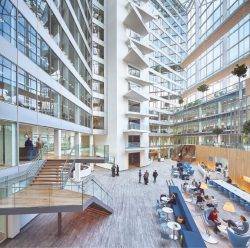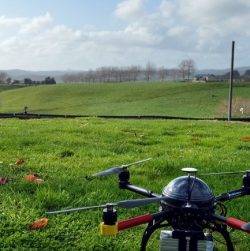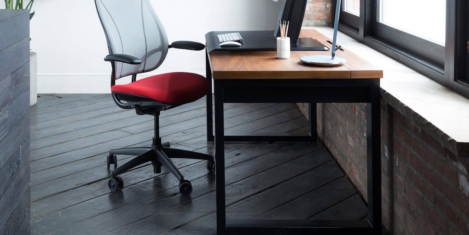January 31, 2018
Creators of the Edge in Amsterdam to develop new generation of Smart buildings
 The creative team behind the development of the world’s most sustainable building – The Edge in Amsterdam – has announced the launch of a real estate technology company. EDGE Technologies, launched by OVG Real Estate CEO Coen van Oostrom will focus on creating a new generation of buildings which feature the latest innovations in sustainability and wellbeing. Whereas parent company OVG is focussed exclusively on the development of its existing portfolio, EDGE Technologies will focus on both the development and the long-term operations of this new generation of buildings, aiming for a cohesive experience across cities. Each EDGE building will be built and operated on the same technology platform and offer consistent user-centred design, created to serve the needs of today’s fast-changing and demanding workforce. To help achieve this the new company is launching a product that will capture and aggregate data across its properties in order to optimize, measure and inform both the user experience and the building’s environmental performance. (more…)
The creative team behind the development of the world’s most sustainable building – The Edge in Amsterdam – has announced the launch of a real estate technology company. EDGE Technologies, launched by OVG Real Estate CEO Coen van Oostrom will focus on creating a new generation of buildings which feature the latest innovations in sustainability and wellbeing. Whereas parent company OVG is focussed exclusively on the development of its existing portfolio, EDGE Technologies will focus on both the development and the long-term operations of this new generation of buildings, aiming for a cohesive experience across cities. Each EDGE building will be built and operated on the same technology platform and offer consistent user-centred design, created to serve the needs of today’s fast-changing and demanding workforce. To help achieve this the new company is launching a product that will capture and aggregate data across its properties in order to optimize, measure and inform both the user experience and the building’s environmental performance. (more…)





















 Two-thirds (64 percent) of employees have gone to work despite being unwell over the last 12 months, claims a new survey which found that a quarter (26 percent) of people worried that their absence will be a burden on their team. The research by Bupa shows that more than one in four (27 percent) employees ignore their doctor’s orders to stay at home and ‘soldier on’. A third of employees would go to work despite back pain or issues related to their joints and, disturbingly, a similar number (29 percent) head to work when suffering from mental health issues such as depression. As two of the most common reasons to be signed off work, Bupa’s experts fear these employees risk worsening their health, increasing the likelihood that they’ll need a prolonged period of time off work further down the line. The findings come at a time when increasing productivity is a strategic goal for most business leaders in 2018. But high levels of ‘presenteeism’ are in fact associated with loss of productivity and reduced performance – as employees who push themselves into work when unwell, risk delaying their own recovery
Two-thirds (64 percent) of employees have gone to work despite being unwell over the last 12 months, claims a new survey which found that a quarter (26 percent) of people worried that their absence will be a burden on their team. The research by Bupa shows that more than one in four (27 percent) employees ignore their doctor’s orders to stay at home and ‘soldier on’. A third of employees would go to work despite back pain or issues related to their joints and, disturbingly, a similar number (29 percent) head to work when suffering from mental health issues such as depression. As two of the most common reasons to be signed off work, Bupa’s experts fear these employees risk worsening their health, increasing the likelihood that they’ll need a prolonged period of time off work further down the line. The findings come at a time when increasing productivity is a strategic goal for most business leaders in 2018. But high levels of ‘presenteeism’ are in fact associated with loss of productivity and reduced performance – as employees who push themselves into work when unwell, risk delaying their own recovery








